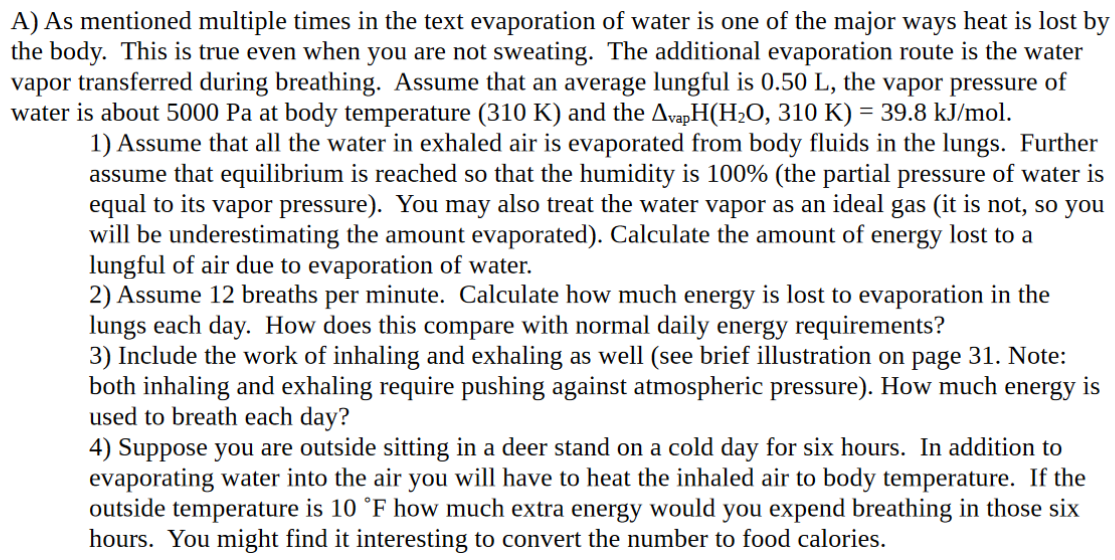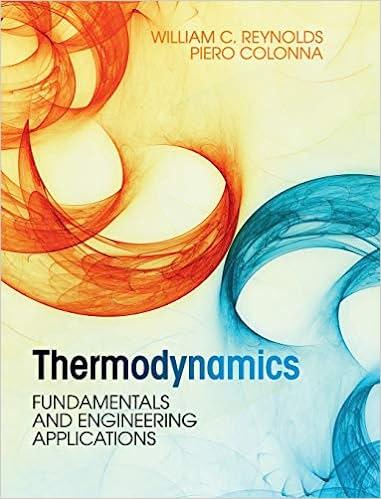
A) As mentioned multiple times in the text evaporation of water is one of the major ways heat is lost by the body. This is true even when you are not sweating. The additional evaporation route is the water vapor transferred during breathing. Assume that an average lungful is 0.50 L, the vapor pressure of water is about 5000 Pa at body temperature (310 K) and the AvapH(H20, 310 K) = 39.8 kJ/mol. 1) Assume that all the water in exhaled air is evaporated from body fluids in the lungs. Further assume that equilibrium is reached so that the humidity is 100% (the partial pressure of water is equal to its vapor pressure). You may also treat the water vapor as an ideal gas (it is not, so you will be underestimating the amount evaporated). Calculate the amount of energy lost to a lungful of air due to evaporation of water. 2) Assume 12 breaths per minute. Calculate how much energy is lost to evaporation in the lungs each day. How does this compare with normal daily energy requirements? 3) Include the work of inhaling and exhaling as well (see brief illustration on page 31. Note: both inhaling and exhaling require pushing against atmospheric pressure). How much energy is used to breath each day? 4) Suppose you are outside sitting in a deer stand on a cold day for six hours. In addition to evaporating water into the air you will have to heat the inhaled air to body temperature. If the outside temperature is 10 F how much extra energy would you expend breathing in those six hours. You might find it interesting to convert the number to food calories. A) As mentioned multiple times in the text evaporation of water is one of the major ways heat is lost by the body. This is true even when you are not sweating. The additional evaporation route is the water vapor transferred during breathing. Assume that an average lungful is 0.50 L, the vapor pressure of water is about 5000 Pa at body temperature (310 K) and the AvapH(H20, 310 K) = 39.8 kJ/mol. 1) Assume that all the water in exhaled air is evaporated from body fluids in the lungs. Further assume that equilibrium is reached so that the humidity is 100% (the partial pressure of water is equal to its vapor pressure). You may also treat the water vapor as an ideal gas (it is not, so you will be underestimating the amount evaporated). Calculate the amount of energy lost to a lungful of air due to evaporation of water. 2) Assume 12 breaths per minute. Calculate how much energy is lost to evaporation in the lungs each day. How does this compare with normal daily energy requirements? 3) Include the work of inhaling and exhaling as well (see brief illustration on page 31. Note: both inhaling and exhaling require pushing against atmospheric pressure). How much energy is used to breath each day? 4) Suppose you are outside sitting in a deer stand on a cold day for six hours. In addition to evaporating water into the air you will have to heat the inhaled air to body temperature. If the outside temperature is 10 F how much extra energy would you expend breathing in those six hours. You might find it interesting to convert the number to food calories







